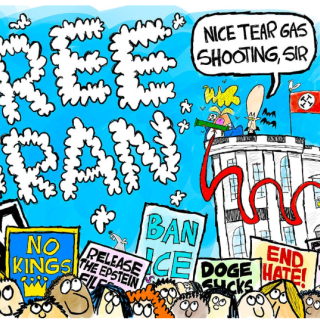Fossicking through the discord and strife in the world, to find some alluvial meaning, or trace elements of hope, and the common truth about their value and their sources, we have to kneel down, get close, and appreciate anew, the difference between muck, fool’s gold and gold.
Our social media is inundated with sensationalist news, boosted and curated deliberately to incite outrage, and as a society, we have normalised the habit of ejaculating our meaningless opinion onto everything.
Our news media have long since ceased being the vigilant guardians of public discourse, the Fourth Estate's foundational role. They have declined in virtue and value, increasingly favouring immediacy over investigation, and provocation over profundity, leaving the essential mission of informing the public with unbiased and thorough journalism in the balance. This decline has eroded the bedrock of trust and accountability that should underpin our information landscape.
The Fourth Estate, a term synonymous with journalism, serves as a foundational pillar of democracy by informing the public, acting as a watchdog against abuses of power or neglect of responsibility, providing a forum for debate, setting the public agenda, educating on diverse issues, and encouraging civic engagement. Through these roles, journalism wields the influence to shape public opinion and holds the powerful accountable, ensuring transparency and contributing to the health of society's democratic processes.
In the quest for truth and enlightenment, akin to panning for gold amid the debris, the Fourth Estate should be the discerning eye that separates valuable insights from the commonplace gravel of information. But they are not only failing to live up to this charge but have become guilty of agitating the sediment they ought to sift, clouding the clear stream of understanding they are meant to serve. This failure has led to a proliferation of the very confusion and chaos the Fourth Estate was intended to dispel.
The quality of our media landscape is a direct and telling reflection of our collective choices and the standards we allow and uphold in ourselves. By elevating those standards, both as consumers and potential creators of content, we are empowered to shape a more informed, empathetic, and truthful world.
There is a small merit to shock journalism, to short-circuit the insular perspective of the reader’s own province of belief or special interest that fails to consider broader contexts or differing viewpoints. But when everything is a shock, nothing is. We have hedonically adapted to the prevalence of shock headlines to the point where even if we are not dragged into the bilge of outrage and animus, we slide into the languid pools of apathy.
We get what we allow. We are who we repeatedly choose to be. Until we, the people, demand better, from news media, from social media and both from and for ourselves, we will get the internet and ultimately the world we deserve.
The following poem is a window onto the psychological practice of ‘a journalism’, an internal stance of accountability, courage, radical honesty, discernment, and coherence that we are invited to practice, to tidy up our own distortions and drama. This is the only way in which we might make way for perspective and understanding. Our present moment in history, our mounting storm of troubles and our contribution to the story of humanity is defined less by the facts and details of conflict and suffering in the world, than by our inability to resolve the conflict we feel within.
This is more than a piece of creative writing; it is a gift given in the spirit of invitation. The invitation is to introspection and a call to the higher standards of personal accountability that are quintessential for realising societal progress. Every gift is an invitation to the deeper gift.
A good poem is like a joke, if you have to explain it too much, some quality is diminished in the exchange, but at least, in the spirit of reaching your head, your heart and your gut in equal measure, I might as well tell you the spirit in which it was intended.
The multivalent lineation of the poem is not arbitrary. The lines have been crafted and broken deliberately to create space for more meanings and interpretations than a single line or a series of lines one-dimensionally conveys. To properly understand the poem, and allow it to reach you, you have to dwell on each line alone, read both between and across the lines and allow the different permutations of meaning to find you and conspire to both a greater meaning, and echo something about the intangible essence of the craft of journalism itself.
Spoiler: The poem both describes and enacts the essence of journalism. The challenge to the reader is to engage with the text both critically and empathetically, just as a good journalist engages with their subject, to provide an invitation to deeper understanding, to challenge apathy and provincialism of belief.
PRESS BRIEFING? THIS WAY.
Only the very clear
or the very bright
will get this, but
you might as well
all hear it
together.
I want to
invite you to
put your journalists’ hat
on.
Writing
to explain
it to myself
like this
is how I
process.
Make sure
you understand
that.
It allows me to
put on my journalist's hat, and
look
closely at things
the human heart wants
to look away from,
especially
when we
are in anguish or
in grief.
We get to
be vulnerable,
you know?
We get to
be honest,
without shame
—even how we are left,
to shame
more by circumstance,
than by sin or flaw.
You can see
how it is
right?
It allows me to
report honestly,
not clinically,
not in a reductionist way at all,
but in that
special way
that journalists sport
which we may call
the curiosity
of a saint
about the nature of
a trouble
or a joy.
Where they take
a completely objective stance,
to even
the rawest livid aftermath and
its most grievous need
for compassion.
They do this
even climbing
through the broken window
—of their own,
and others'—raw! and
empathetic hearts.
This
allows
them
to create
a report,
the elements and essence of
a human story,
that can reach people.
And so often,
the best way to
reach people
when they are aggrieved
or grieving, is
via the heart.
Good journalism can
convey truth in this way.
It is so ironic that we
should make careers named
for this noble indifference,
where the impostors
are incapable of
such courage and
such an unsung
quality of
true leadership.
That’s it!
The hat
looks good on
you.
This way,
We look forward
to your contribution and
we celebrate
your devotion to
this
noble craft.
Rocco Jarman
So, this then, is the invitation for you today;
To either be that journalist at times yourself, when looking at the discord and strife in the world, and honouring, like the journalist must, the clean way of holding that messy line — between paying real attention, not letting your emotion cloud your perception and remembering clearly what you observe and recalling faithfully, the clamour of emotion, right down to the shoes it wore, that attempted to rush into the room and trample over the scene. To be both: the dispassionate eyes of the pathologist doing an autopsy on the body, not yet fully rigid, preparing to give the most clinical account—and the eulogist—the bearer of the ladle of emotion, stirring the deep pot of human feelings, to lift the settled bits from the bottom, and spoon a rich but ultimately digestible serving of the whole truth of the stew.
And for the rest, when the truth, gravity, and the scale of it all, lie far beyond your fair attempt to capture, then, you have to honour the standards of journalism from both sides of the pen. That means three things: the first, is committing to refrain from assumption and heated speculation until the autopsy is finalised, until all the facts are in. The second is to not judge the meal until you have tasted it, until you have made a concerted effort to chew through the tough bits and given some time to properly digest it.
Lastly, and just as key, it must mean demanding better commitment to the standards of those who would hold the scalpel or the ladle. We have to demand better standards of ourselves when it comes to news how we receive it and how we interact with the poor expressions we find online, and a better standard in alignment with the true vocation of journalism than we have been getting from those who assume to wield the pen.
I want better for you, not from you.
We get what we allow. We are who we repeatedly choose to be. Until we, the people, demand better, from news media, from social media and both from and for ourselves, we will get the internet and ultimately the world we deserve.
--------------------------------------------------
Rocco Jarman is a poet and freelance writer living in Western Australia. His Substack articles dissect the pressing need for self-ownership, discernment, and critical thinking in our discourse. A staunch advocate for solution-driven dialogue, his writings challenge readers to rise above passive consumption and engage actively in crafting a narrative that contributes to the resolution rather than exacerbating the problem, in the service of a well-informed, and self-determining public.



